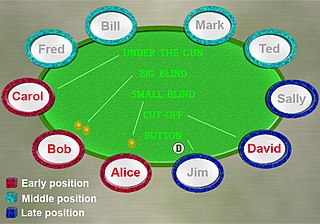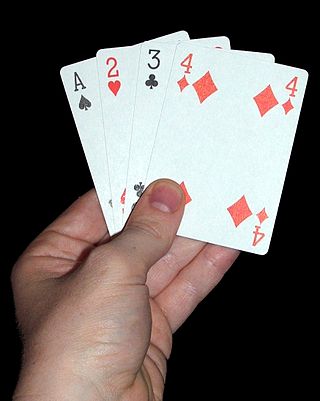Five-card draw is a poker variant that is considered the simplest variant of poker, and is the basis for video poker. As a result, it is often the first variant learned by new players. It is commonly played in home games but rarely played in casino and tournament play. The variant is also offered by some online venues, although it is not as popular as other variants such as seven-card stud and Texas hold 'em.

Poker is a family of comparing card games in which players wager over which hand is best according to that specific game's rules. It is played worldwide, but in some places the rules may vary. While the earliest known form of the game was played with just 20 cards, today it is usually played with a standard deck, although in countries where short packs are common, it may be played with 32, 40 or 48 cards. Thus poker games vary in deck configuration, the number of cards in play, the number dealt face up or face down, and the number shared by all players, but all have rules that involve one or more rounds of betting.
A check-raise in poker is a common deceptive play in which a player checks early in a betting round, hoping someone else will open. The player who checked then raises in the same round.
Protection in poker is a bet made with a strong but vulnerable hand, such as top pair when straight or flush draws are possible. The bet forces opponents with draws to either call with insufficient pot odds, or to fold, both of which are profitable for the betting player. By contrast, if he failed to protect his hand, another player could draw out on him at no cost, meaning he gets no value from his made hand.
In poker, pot odds are the ratio of the current size of the pot to the cost of a contemplated call. Pot odds are compared to the odds of winning a hand with a future card in order to estimate the call's expected value. The purpose of this is to statistically guide a player's decision between the options of call or fold. Raising is an alternative to place this decision on the opponent.
In the game of poker, opens and raises are considered aggressive plays, while calls and checks are considered passive. It is said that "aggression has its own value", meaning that often aggressive plays can make money with weak hands because of bluff value. In general, opponents must respond to aggressive play by playing more loosely, which offers more opportunities to make mistakes.

In the card game of poker, a bluff is a bet or raise made with a hand which is not thought to be the best hand. To bluff is to make such a bet. The objective of a bluff is to induce a fold by at least one opponent who holds a better hand. The size and frequency of a bluff determines its profitability to the bluffer. By extension, the phrase "calling somebody's bluff" is often used outside the context of poker to describe situations where one person demands that another proves a claim, or proves that they are not being deceptive.

In the game of poker, the play largely centers on the act of betting, and as such, a protocol has been developed to speed up play, lessen confusion, and increase security while playing. Different games are played using different types of bets, and small variations in etiquette exist between cardrooms, but for the most part the following rules and protocol are observed by the majority of poker players.
Five-card stud is the earliest form of the card game stud poker, originating during the American Civil War, but is less commonly played today than many other more popular poker games. It is still a popular game in parts of the world, especially in Finland where a specific variant of five-card stud called Sökö is played. The word sökö is also used for checking in Finland.

Texas hold 'em is one of the most popular variants of the card game of poker. Two cards, known as hole cards, are dealt face down to each player, and then five community cards are dealt face up in three stages. The stages consist of a series of three cards, later an additional single card, and a final card. Each player seeks the best five card poker hand from any combination of the seven cards; the five community cards and their two hole cards. Players have betting options to check, call, raise, or fold. Rounds of betting take place before the flop is dealt and after each subsequent deal. The player who has the best hand and has not folded by the end of all betting rounds wins all of the money bet for the hand, known as the pot. In certain situations, a "split-pot" or "tie" can occur when two players have hands of equivalent value. This is also called a "chop-pot". Texas hold 'em is also the H game featured in HORSE and in HOSE.
Caribbean stud poker, also called casino stud poker, is a casino table game with rules derived from five-card stud poker. However, unlike standard poker games, Caribbean stud poker is played against the house rather than against other players. There is no option to bluff or deceive as this is played against the house and not other players.
The fundamental theorem of poker is a principle first articulated by David Sklansky that he believes expresses the essential nature of poker as a game of decision-making in the face of incomplete information.
Every time you play a hand differently from the way you would have played it if you could see all your opponents' cards, they gain; and every time you play your hand the same way you would have played it if you could see all their cards, they lose. Conversely, every time opponents play their hands differently from the way they would have if they could see all your cards, you gain; and every time they play their hands the same way they would have played if they could see all your cards, you lose.

Badugi is a draw poker variant similar to triple draw, with hand-values similar to lowball. The betting structure and overall play of the game is identical to a standard poker game using blinds, but, unlike traditional poker which involves a minimum of five cards, players' hands contain only four cards at any one time. During each of three drawing rounds, players can trade zero to four cards from their hands for new ones from the deck, in an attempt to form the best badugi hand and win the pot. Badugi is often a gambling game, with the object being to win money in the form of pots. The winner of the pot is the person with the best badugi hand at the conclusion of play. Badugi is played in cardrooms around the world, as well as online, in rooms such as PokerStars. Although it hasn’t had its own tournament per se at the WSOP, it is featured in the Dealers Choice events as well as in the Triple Draw Mix. A Badugi tournament is scheduled during the 2023 WSOP event.
In no-limit or pot-limit poker, a post-oak bluff is a very small bet relative to the size of the already-existing pot. This type of bluff may be employed as an attempt at using reverse psychology to steal the pot. It holds comparatively little risk for the player making the bet. The term was popularized by Doyle Brunson in his 1979 book Super System.
Fold equity is a concept in poker strategy that is especially important when a player becomes short-stacked in a no limit tournament. It is the equity a player can expect to gain due to the opponent folding to his or her bets. It equates to:
Negative freeroll occurs in poker when a player places an all-in wager on a hand that can only either tie or lose. A negative freeroll is relatively common in low stakes amateur play, but in higher stakes play, it is considered a serious blunder to allow a negative freeroll on the final round of betting due to the amount of risk involved.
The following is a glossary of poker terms used in the card game of poker. It supplements the glossary of card game terms. Besides the terms listed here, there are thousands of common and uncommon poker slang terms. This is not intended to be a formal dictionary; precise usage details and multiple closely related senses are omitted here in favor of concise treatment of the basics.
Poker is a popular card game that combines elements of chance and strategy. There are various styles of poker, all of which share an objective of presenting the least probable or highest-scoring hand. A poker hand is usually a configuration of five cards depending on the variant, either held entirely by a player or drawn partly from a number of shared, community cards. Players bet on their hands in a number of rounds as cards are drawn, employing various mathematical and intuitive strategies in an attempt to better opponents.
Draw poker is any poker variant in which each player is dealt a complete hand before the first betting round, and then develops the hand for later rounds by replacing, or "drawing", cards.
Kiu kiu or qiu qiu is a game of dominoes popular in Indonesia related to pai gow. It may also be referred to as 99 domino poker.



